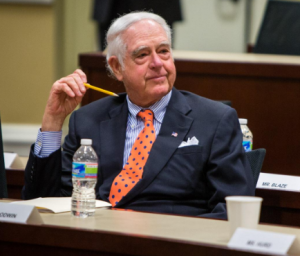by James A. Bacon
William H. Goodwin Jr., rector of the University of Virginia, has taken to the Washington Post to defend the university’s $2.3 billion “Strategic Investment Fund,” which will generate up to $100 million a year in cash to advance the university’s strategic plan.
Expenditures will undergo a two-tier review process before approval by the board, Goodwin wrote. “This is no blank check,”he added, disputing former rector Helen Dragas’s characterization of the fund as a “slush fund.”
“This fund is an extraordinary opportunity to improve academic quality, help minimize tuition costs and student debt, conduct research that benefits society, and offer world-class medical care,” Goodwin wrote.
The possibilities are endless. They might include specialized equipment or research labs, recruitment of the finest faculty talent, or initiatives that enhance student life. They could include seed money for endowed student scholarships, support programs to further improve access and affordability for Virginians, and more. …
We have approved and are implementing a new strategic plan. We have formalized our efforts to find efficiencies and cost savings. We constructed and put into place a multiyear financial plan that addresses the university’s priorities across years instead of starting from scratch every budget cycle.
We have approved and implemented a program, “Affordable Excellence,” to ensure that tuition increases, when necessary, are predictable and minimal, while dramatically reducing the amount of student debt facing Virginia families. Middle-class Virginia families directly benefit from this relief, as do those with high financial need.
To the extent that investments from this fund allow the university to address long-term excellence without using tuition, the net effect will be greater affordability and value – not for a year or two, but well into the future.
Bacon’s bottom line: I have great respect for Bill Goodwin, the most successful Richmond businessman and philanthropist of his generation. And I have no question that he has the best interest of the University of Virginia at heart. But what seems clear, and this op-ed does nothing to dispel, is that his vision of UVa’s future is aligned with that of the UVa administration — not necessarily with that of its alumni or of parents paying ever-escalating tuition and fees.
Moreover, Goodwin’s op-ed never addresses Dragas’s charge that the board held a closed session in June, possibly illegally, to discuss the Strategic Investment Fund or that university officials implored board members not to mention the meeting to legislators or the media. (For that matter, neither has the university department of public affairs. UVa’s stance seems to be one of ignoring the controversy in the hope that it will simply go away.)
There is a legitimate case to be made for the university’s strategic plan, which aims to vault UVa into the ranks of the Top 10 universities nationally by prioritizing the hiring of superstar faculty, the bolstering of R&D, the boosting of out-of-state students, and adoption of a high tuition/high aid financial model over curtailing tuition increases. (I don’t share that vision, but I concede that it is a legitimate viewpoint to have.) But there also is a legitimate case to be made for easing the tuition burden on Virginia families.
The University of Virginia is one of the most precious assets of the Old Dominion: The potential to gain admittance to UVa and enjoy an affordable, world-class education is one of the great blessings of living in this state. Executing and paying for the university’s transformative vision must achieve buy-in from stakeholders outside the university, such as tuition-paying parents, a state government that still provides substantial funding, and indeed the entire citizenry. If decisions are made without full openness and transparency, an inherently contentious process will become even more contentious.



